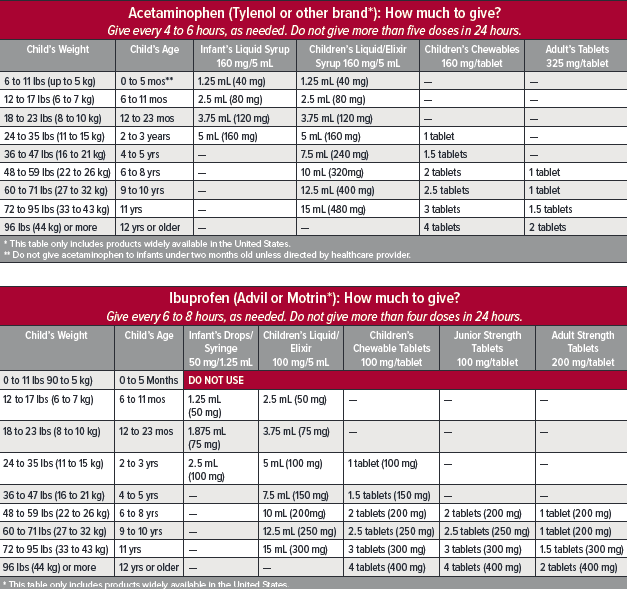Safe Dosing for Sick Kids

When your child is sick or in pain, over-the-counter analgesics like Tylenol or Ibuprofen can provide a great deal of relief. While pain is common in many injuries and illnesses your children may experience, administering any type of pain-relief must be done with the utmost care.
The American Academy of Pediatrics (AAP) warns that even though a medicine may be available without a prescription, it does not mean that they are harmless. In fact, over-the-counter medications can be very dangerous to children if they aren’t administered correctly.
But finding the correct dose for your child doesn’t have to be guesswork. The guide below will help you give your child the correct dose every time.

General Guidelines
Acetaminophen
- Unless instructed by your child’s pediatrician, do not give acetaminophen to infants under two months old.
- Don’t give your child more than five doses in 24 hours, and only on instruction by your child’s doctor.
- Concentrated infant drops (80 mg/0.8 mL) are no longer sold. If you still have some at home, they’re expired and should be safely discarded. Check the concentration and expiration dates of medication you have.
Ibuprofen
- Don’t give ibuprofen to infants under six months old.
- Don’t give your child more than four doses in a 24-hour period and only on instruction by your child’s doctor.
- If your child is dehydrated, vomiting, or has kidney problems, do NOT give them ibuprofen. Your child’s doctor will recommend an appropriate analgesic.
Safety Tips
These tips will help you administer over-the-counter medicines to your children correctly and safely:
- The correct dose for your child is based on their weight, not their age. Do not guess their weight — acetaminophen and ibuprofen can be dangerous when given in the wrong dose.
- Always read the labels: Don’t guess the dose to give your child. Read the instructions clearly and follow them.
- There is a difference between eating utensils and measuring spoons. Always use properly labeled medical measuring spoon, a dosing cup, or children’s medicine syringe to administer medicine.
- A tablespoon is abbreviated to TBSP and it is about 15 ml. A teaspoon is abbreviated to TSP and is about 5 ml. The difference between a TBSP and a TSP is 10 ml and getting it wrong can be very harmful to your child.
- Don’t ever give more than the dose on the directions, even if you think your child is sicker than the last time they were given medicine. Giving extra medication won’t make them better, it can be very dangerous.
- Always check with your healthcare provider or a pharmacist before giving your child two medications at a time. Some medicines have contraindications with others, so always check that the two medicines can be safely taken together.
- Use child-resistant caps.
- Don’t give aspirin to anyone under age 20.
- Analgesics will help your kids with pain and fever reduction, but they do not make illness or infection go away any faster.
- Never let children take medicines by themselves.
- Do NOT tell your children that medicine is candy or a treat so that they will take it. If they come across the medicine on their own, they might think of it as candy and self-administer.
- Ensure you are administering the medicine in light where you can easily read the label and the dosage. Darkness increases the risk of giving the wrong medicine or dosage.
- Check everything more than once — read the label before opening the bottle, after removing a dose, and again before giving the dose.
- Always use child-resistant caps on medicines and lock medicines away so that children cannot access it.
- Always check medicine packages for signs of tampering before buying it or using it.
Always err on the side of caution when it comes to children’s medication dosages. If you have any concerns, check with your trusted pharmacist or pediatrician.
Cough and Cold Medicines
Many cough and cold medicines contain a combination of ingredients, and it is important to know what is in each medication if you are giving multiple medications. A lot of them already have Tylenol or Motrin in them and it is easy to overdose your child. That is one of the reasons that the AAP has recommendations for cold medicine for young children.
“Oral over-the-counter (OTC) cough and cold medicines can cause serious harm to young children,” warns Marianne Dunlap, M.D., pediatrician at Oklahoma Children’s Hospital OU Health. “The risks of using these medicines are more than any help the medicines might have in reducing cold symptoms.”
Dr. Dunlap recommends the following guidelines for over-the-counter cough and cold medicine:
- Under age 4: Cough medicine is not recommended for babies and young children.
- From ages 4 to 6 years: Cough medicine should be used only if recommended by your child's doctor.
- After age 6: Cough medicines are safe to use. Be sure to follow the instructions on the package about the right amount of medication to give.
Schedule a Pediatric Appointment Today
You can trust OU Health for pediatric care close to home. Find a pediatrician or primary care provider near you.


.png)
.png)